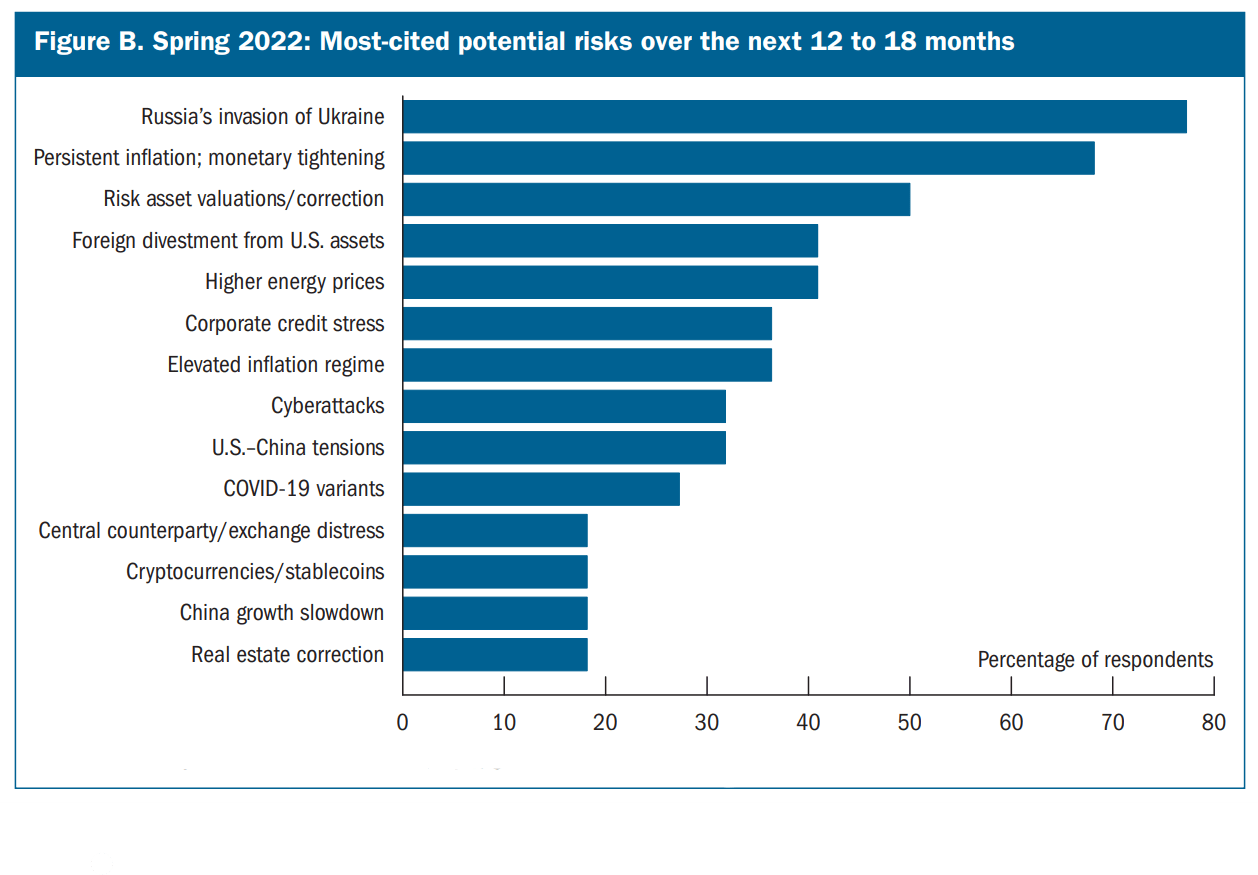Crypto no more in top 10 most-cited potential risks: US central bank report

While proponents of traditional finance remain keen on dismissing Bitcoin (BTC) and the crypto ecosystem as financial risks, a survey conducted by the Federal Reserve Bank of New York — one of the 12 federal reserve banks of the United States — revealed 11 factors that overshadow crypto in terms of risk in 2022.
Geopolitical tensions, foreign divestments, COVID-19 and high energy prices were found to be some of the most-cited potential risks for the US economy, according to a central bank survey published by the Federal Reserve System.

Federal Reserve Bank of New York survey results. Source: Federal Reserve System
Out of the 14 factors that pose a financial risk, crypto stands at the 11th position — revealing a change in investor mindset owing to the continued efforts of crypto entrepreneurs to educate the masses.
Some of the pressing risk concerns raised by the respondents were related to the power struggle of global economies, which includes the U.S.-China tensions, the Russia-Ukraine war, higher energy prices, rising inflation, the COVID-19 pandemic and cyberattacks, to name a few.
However, the U.S central maintains its anti-cryptoposition when it comes to evaluating the risks in crypto investment. It pointed out in the report that selected cryptocurrencies — including BTC, Ether (ETH), Binance Coin (BNB), Cardano (ADA) and XRP — are down about 69 percent in value compared to the Nov. 2021 peak, adding that:
“Speculation and risk appetite appear to be the primary driving forces of crypto-asset prices, which have recorded big swings in recent years.”
The central bank also cited the collapse of the Terra (LUNA) ecosystem, highlighting that entities that had direct exposure to the in-house stable TerraUSD (UST) found themselves in financial distress, sometimes leading to bankruptcy.”
Related: Joe Biden unhappy with Elon Musk for buying a platform that “spews lies”
On the other side of the world, India launched its home-grown central bank digital currency (CBDC) for the wholesale segment.
While the country is still opposed to the idea of mainstreaming cryptocurrencies, the pilot project saw the involvement of nine local traditional banks, which include the State Bank of India, Bank of Baroda, Union Bank of India, HDFC Bank, ICICI Bank, Kotak Mahindra Bank, Yes Bank, IDFC First Bank and HSBC.
Related reports suggested that India’s central bank — the Reserve Bank of India (RBI) — plans to launch the digital rupee for the retail segment within a month in select locations.






 Bitcoin
Bitcoin  Ethereum
Ethereum  Tether
Tether  USDC
USDC  TRON
TRON  Dogecoin
Dogecoin  Cardano
Cardano  Bitcoin Cash
Bitcoin Cash  Monero
Monero  Chainlink
Chainlink  LEO Token
LEO Token  Stellar
Stellar  Zcash
Zcash  Litecoin
Litecoin  Hedera
Hedera  Dai
Dai  Cronos
Cronos  Tether Gold
Tether Gold  OKB
OKB  Ethereum Classic
Ethereum Classic  KuCoin
KuCoin  Cosmos Hub
Cosmos Hub  Gate
Gate  Algorand
Algorand  Dash
Dash  VeChain
VeChain  Tezos
Tezos  Stacks
Stacks  TrueUSD
TrueUSD  Decred
Decred  IOTA
IOTA  Theta Network
Theta Network  Basic Attention
Basic Attention  NEO
NEO  Synthetix
Synthetix  Qtum
Qtum  0x Protocol
0x Protocol  Ravencoin
Ravencoin  DigiByte
DigiByte  Zilliqa
Zilliqa  Nano
Nano  Siacoin
Siacoin  Holo
Holo  Numeraire
Numeraire  Waves
Waves  Enjin Coin
Enjin Coin  Ontology
Ontology  Status
Status  BUSD
BUSD  Hive
Hive  Pax Dollar
Pax Dollar  Lisk
Lisk  Steem
Steem  Huobi
Huobi  OMG Network
OMG Network  Bitcoin Gold
Bitcoin Gold  NEM
NEM  Augur
Augur